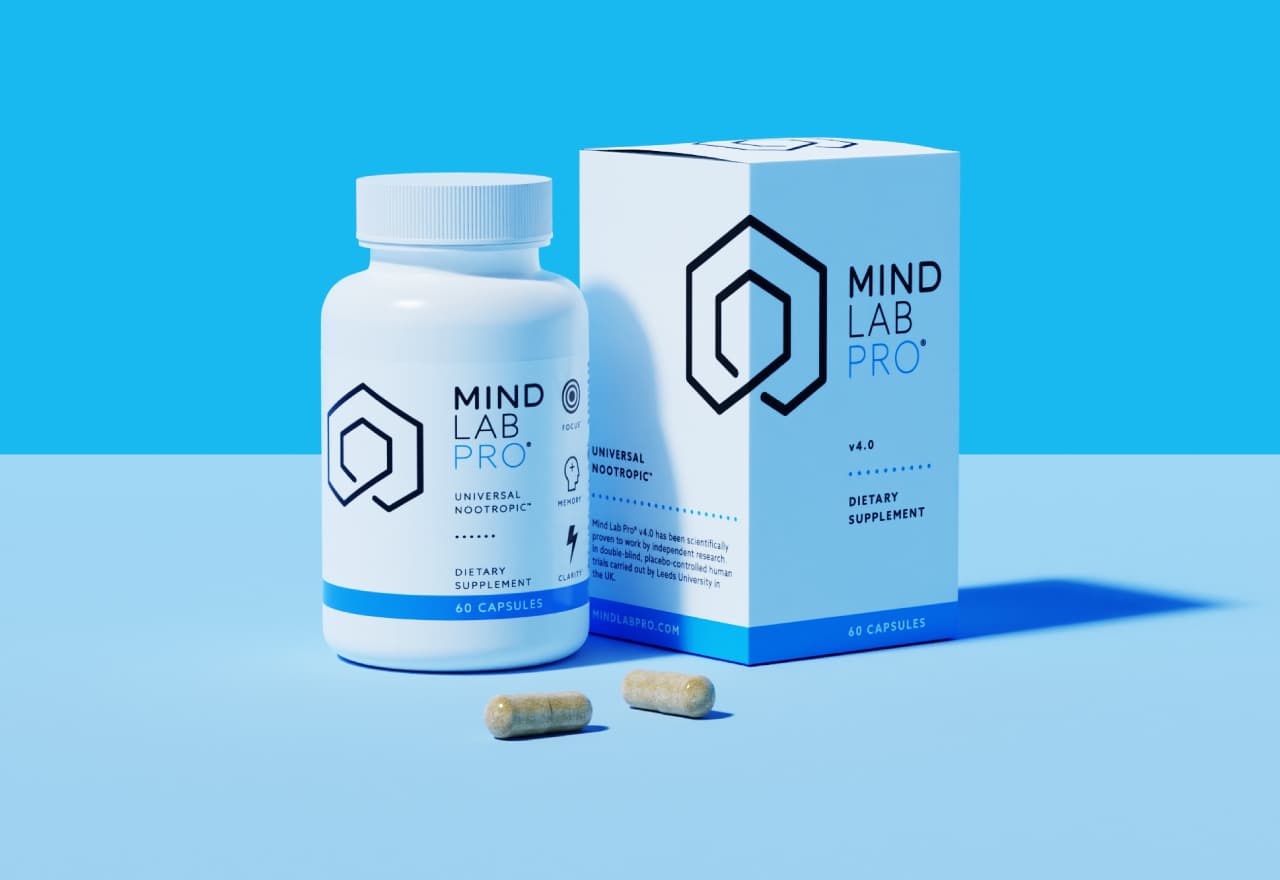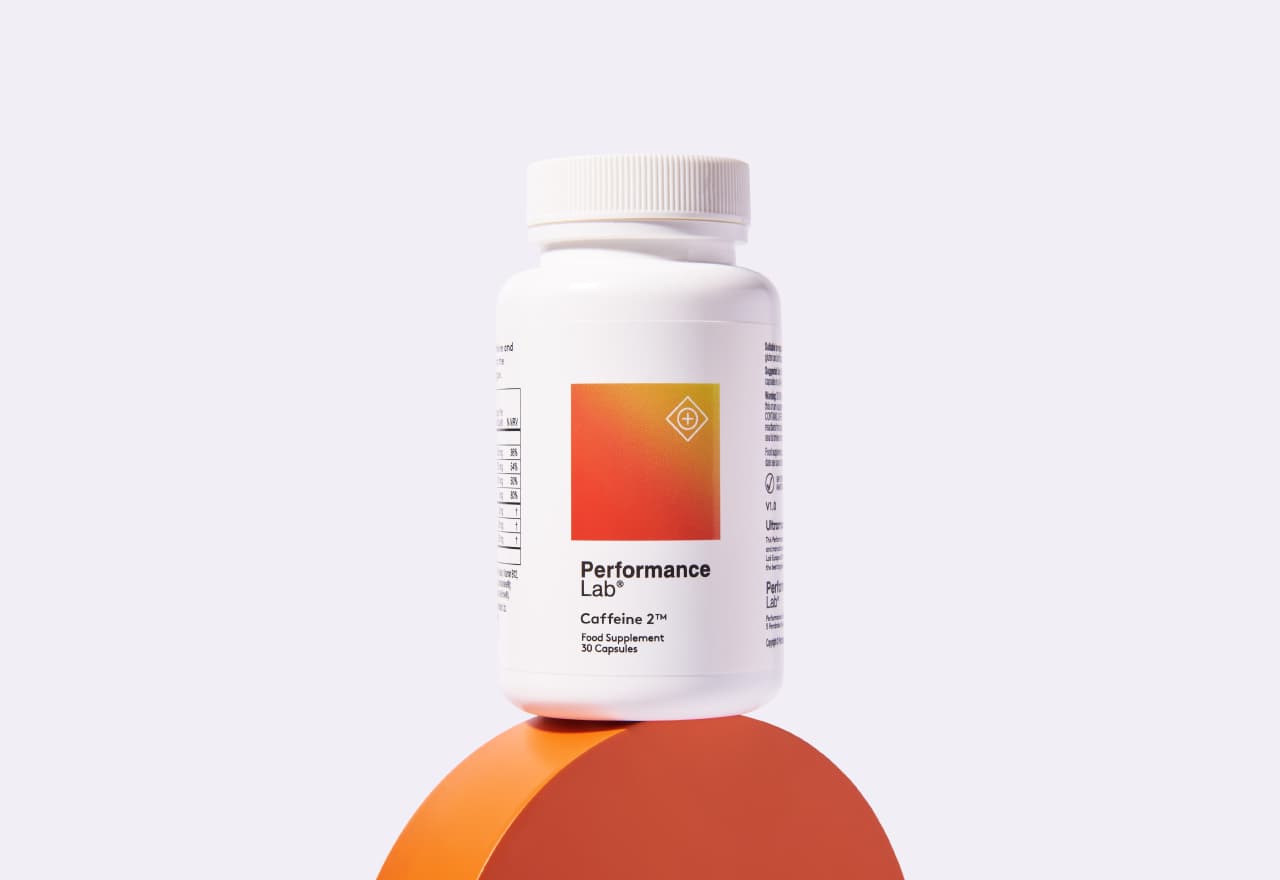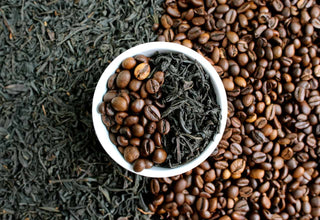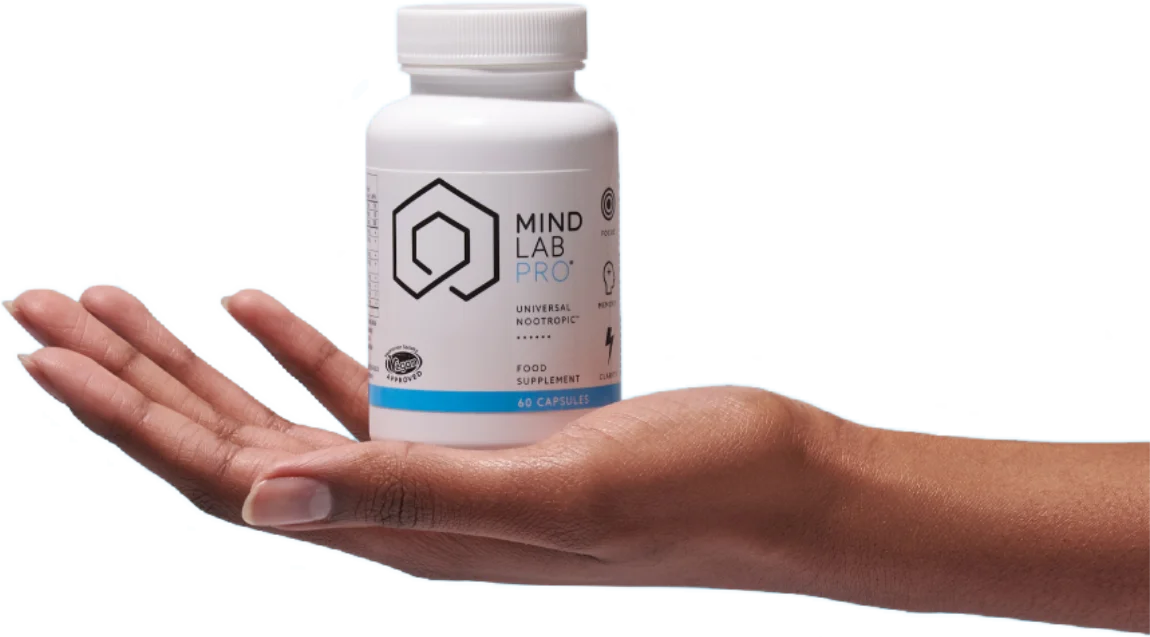Caffeine and L-Theanine form one of the most powerful nootropic combinations for enhancing brainpower. But what's the best caffeine and L-Theanine stack? We're going to reveal two great options in this article, as well as detailing how caffeine and L-Theanine work together.
If you've been in the nootropic game for more than two minutes, you've heard of the benefits - or at least heard that there are benefits - of combining caffeine intake with L-theanine:
- Stacking caffeine with L-theanine removes caffeine's jittery side effects while sustaining the stimulant's boosts on focus and energy.
This is why we wrote this guide on how to find or create the Best Caffeine + L-Theanine Stack, which includes our selection for the best caffeine + L-theanine supplements.
Quick Summary - Best caffeine and L-Theanine stack:
Option #1 - Mind Lab Pro® + Caffeine from any source.
Mind Lab Pro (MLP®) is today's top nootropic dietary supplement overall. It supplies 11 research-backed brain boosters in one clean capsule, including 100 mg of L-Theanine in each serving.
MLP® is caffeine-free -- but it goes great with caffeine. Its L-Theanine, adaptogens and B-Vitamins help make caffeine work better, for enhanced cognitive performance effects.
Get the Best Deal on MLP® Now
Option #2 - Performance Lab® Caffeine 2
Caffeine 2 is a caffeine pill (50 mg) that includes 100 mg L-Theanine plus L-Tyrosine and B-vitamins. It already supplies the brain-boosting theanine caffeine combination in the research-backed 2:1 ratio.
As long as you aren't drinking coffee, Caffeine 2 offers precision and convenience advantages as a caffeine and L-Theanine stack.
Get the best deal on Performance Lab® Caffeine 2 Now
We will explain both of these caffeine stack options in detail towards the end of this article.
The Beginner's Nootropic Stack: Caffeine + L-Theanine
Nootropic stacking is a practice of combining multiple brain-boosters to amplify and expand their beneficial effects. Stacking can get quite complicated. Not all combinations work. But caffeine and L-theanine is one stack that is backed by research and advocated by many biohackers.
What better way to start with nootropics than with the classic caffeine + L-theanine stack?
After all, even if the concept of nootropics is entirely unfamiliar to you, you're likely familiar with caffeine.
You're familiar with the stimulating effects of caffeine, how caffeine feels, how too much caffeine feels, and so on. You may have noticed how caffeine enhances your energy, alertness and focus. You may have also experienced the post-caffeine crash.
Perhaps you have wondered "Is there a way to make caffeine work even better?" And the answer is: Yes, with L-theanine.
Let's examine each of these nutrients individually, and then in combination.
What is Caffeine?

Caffeine is a natural stimulant belonging to the class of compounds known as xanthines. It is found in coffee, tea, chocolate, many soft drinks, and energy drink. Caffeine works by blocking the action of a neurotransmitter called adenosine, which signals the body to prepare for sleep and relaxation.
You may be wondering is caffeine a cognitive enhancer?
When adenosine is blocked, its calming effects are negated, leading to increased alertness and wakefulness. This is why caffeine is commonly consumed to help overcome feelings of tiredness.
In addition to blocking adenosine, caffeine also leads to increased release of other neurotransmitters like dopamine and norepinephrine. These neurotransmitters play a role in mood, attention, mental focus and arousal, and their increased release can contribute to the cognitive-enhancing effects of caffeine.
Research suggests caffeine improves cognitive performance in a few different ways:
Increased Alertness: Caffeine's most noticeable effect is an increase in subjective alertness, helping to stave off feelings of tiredness. Research has suggested that caffeine increases subjective alertness in cases of sleep deprivation.
Increased Energy Levels: Caffeine stimulates the central nervous system, which can make you feel more energized and improve sustained attention task performance.
Mental performance: Another systematic review of 20+ studies suggests what many of us already believe: Caffeine appears to boost mental performance in many ways. Researchers reported that low-to-moderate intake of caffeine may enhance memory, reaction time and mental alertness.(1)
Multitasking performance: Does caffeine improve task switching? In one double blind study, researchers associated caffeine with improved performance on task-switching via enhanced anticipatory processing. Researchers suggested these benefits may have been due to caffeine's effect on brain chemicals, especially dopamine.(2)
Mood Enhancement: Caffeine can increase the release of neurotransmitters like dopamine and norepinephrine, which may help to elevate mood. In one meta-analysis that included over 100 different sources totaling 300,000 study subjects, researchers reported that intake of caffeine (or coffee) appears to be linked to a reduced risk of depression.(3)
Possible brain health promotion: Caffeine is a unique stimulant-nootropic because it may actually benefit brain health. In one study, researchers reported that coffee may have neuroprotective effects. Study subjects who consumed between 3 and 5 cups of coffee daily were found to have a 65% reduction in risk for cognitive decline in their later years. The study's researchers reported that the benefit may be explained by the caffeine and antioxidants that are naturally present in coffee.(4)
While caffeine is generally considered safe when consumed in moderation, it can lead to negative side effects like poor objective sleep quality, nervousness, restlessness, stomach upset, and increased heart rate and respiration, especially at higher doses. Dependence and withdrawal symptoms are also possible with regular use.
In summary, caffeine acts as a nootropic by blocking adenosine receptors, increasing alertness and wakefulness, and enhancing concentration and mood.
The trick seems to be in using caffeine in a safe responsible way to optimize its nootropic effects while minimizing its potential risks and side effects.
What is L-Theanine?

L-theanine is a cognitive enhancing amino acid commonly found in Camellia sinensis (green tea) leaves.
As one of the key bio-active constituents of green tea, L-theanine is responsible for the calming effects that come with sipping on a cup of green tea - or white tea or black tea. Or, really, any tea brewed from Camellia sinensis leaves.
Did you know? Another nootropic bonus of green tea are its antioxidant compounds called catechins. Green tea constituents catechins exert neuroprotective, inflammation-modulating effects in the brain that can assist with healthy aging. L-theanine may regulate blood pressure, relax blood vessels and encourage cerebral blood flow, as well.
Research suggests amino acid L-Theanine works alongside green tea catechins via a unique pathway: it helps to tune the brain to the alpha brainwave frequency (8-14 Hz): an electric neural state often associated with calm, meditative thinking, or "wakeful relaxation."
Alpha waves are described as a sort of "flow" state, like being "in the zone." In this mental state, you may feel like you have one foot in creative innovation and another foot in alert orderliness.
L-theanine's potential benefits may help to ease anxiety symptoms and feelings of apprehension without any sedating effects. Ultimately, this is what makes L-theanine stand out among other nootropic amino acids.
Whether you consume it in green tea or supplements, taking L-theanine helps relax the mind and sharpen focus by promoting alpha brainwaves, not through sedation.
This is an advantage for cognition because calming compounds that work via sedation may make the mind sluggish and dull.
Some clinically backed potential brain and cognitive benefits associated with L theanine supplementation include:
- Calming of the central nervous system. This benefit includes slowing down heart rate, modulating blood pressure and blunting the release of stress hormones, effects associated with a tranquil, relaxing mood and a strengthening of overall resistance to stress.(5)
- May help to maintain attention during challenging mental tasks (either on its own or when combined with caffeine).(6) (you can learn more about nootropics that potentially help with ADHD [attention deficit hyperactivity disorder]. Just be sure to discuss their use with your healthcare provider first).
- Theanine may offer some neuroprotection; it has been suggested to potentially be useful in helping with some types of age-related cognitive decline.(7)
The Combined Effects of Caffeine + L-Theanine
When paired with caffeine, amino acid L-theanine helps sustain its mind-clarifying, mental focus sharpening and energizing benefits while mitigating jittery side effects. The result is a nootropic boost that seems to deliver the best of both worlds for overall mental performance. In addition to elevating cognition, theanine enhances recovery from brain exertion, too.
Researchers have suggested that when combined, caffeine and L-theanine may acutely improve:
Mood and Attention

For the cognitive function benefits of mood and attention, two studies stand out here:
Study #1: one placebo-controlled study compared 50mg caffeine, with and without 100mg L-theanine, on cognition and mood. Researchers reported that the caffeine and theanine stack:
- effectively enhanced study subjects' accuracy and mental processing speed during attention-switching tasks;
- improved study subjects' ability to block out distractions during memory testing
The researchers concluded that the L-theanine caffeine stack helps improve performance on demanding cognitive tasks.(8)
Study #2: another placebo-controlled study on the acute effects of L-theanine (200mg) and caffeine (160mg) on attention found that "theanine and caffeine seem to have additive effects on attention in high doses."(9)
Together, these studies suggest that caffeine + L-theanine, when combined, may possess a greater synergy of positive effects on mood and attention than when taken alone.
Performance on Demanding Cognitive Tasks
Measuring cognitive performance, self-reported mood, blood pressure, and heart rate before and after taking L-theanine (97mg) and caffeine (40mg), a group of researchers observed significant improvements on accuracy during task-switching tests and self-reported alertness, as well as reduced self-reported tiredness, with the L-theanine and caffeine combination.
Their conclusion on the l theanine caffeine combo: 97 mg of L-theanine in combination of 40 mg of caffeine helps to focus attention during a demanding cognitive task.(10)
Elimination of Caffeine's Blood Vessel Narrowing Effect
One major reason why exercisers avoid caffeinated pre-workout supplements is due to caffeine's promotion of vasoconstriction -the narrowing of blood vessels that restricts blood flow, raises blood pressure and leads to negative side effects. Nootropic users seeking increased delivery of nutrients and oxygen to the brain for sharper cognitive may wish to avoid vasoconstrictors.
However, one double-blind, placebo-controlled study suggests that "combining L-theanine with caffeine, at levels and ratios equivalent to one to two cups of tea, eliminated the vasoconstrictive [...] effects of caffeine."(11)
This spells good news for those who may avoid caffeine due to its potential negative impact on blood vessels and blood pressure.
How to Stack Caffeine with L-Theanine
When you create your stack, be mindful of your caffeine L-Theanine ratio. In general, the combo will likely work so long as you stack more L-theanine than caffeine, most research pinpoints the best theanine-to-caffeine ratio at 2:1.
In other words, if the average cup of coffee supplies around 100mg caffeine, you'll need to add 200mg L-theanine to hit that 2:1 sweet spot.
Of course, taking the "cup of coffee" approach to combining caffeine + L-theanine isn't the most reliable way to do this. Consider this when deciding on coffee vs nootropics supplementation for your caffeine dosage.
After all, you can only estimate how much caffeine is in your coffee. Which is why taking a premade caffeine + L-theanine supplement "mini-stack" seems the best way to go.
Additional Nootropics to Consider for Your Stack
Adaptogens: Rhodiola Rosea and Bacopa Monnieri

Caffeine can be literally stressful, meaning that caffeine stimulates secretion of stress hormone cortisol. Too much stress may significantly damage various measures of our mental and physical health.
Rhodiola rosea and Bacopa monnieri help by strengthening resistance to physical and psychological stresses. These two adaptogen herbs work by regulating the Hypothalamus-Pituitary-Adrenal (HPA) Axis, the bio-pathway that triggers the release of cortisol in response to stress.
In addition, Rhodiola and Bacopa are natural mind-body energizers in their own right, with each offering a whole host of additional nootropic benefits that stack beautifully with caffeine and L-Theanine.
You can learn more about Rhodiola Rosea here and more on Bacopa Monnieri here.L-Tyrosine

Catecholamines brain chemicals, such as dopamine and norepinephrine, are key brain chemicals required to maintain high levels of focus, awareness, and positive mood under otherwise stressful situations.
These brain chemicals may be depleted by caffeine, which leads to "crashing," brain fog, less-than-optimal cognitive performance and other stress related symptoms.
Stacking caffeine with L-tyrosine may significantly help replenish and nourish the brain against the caffeine crash, sustaining attention and mood well beyond when the caffeine wears off.
Caffeine, L-Theanine and L-Tyrosine (which are all in MLP and Caffeine 2) are yet another research-backed stack that may work as a nootropic-ergogenic for athletes.
Caffeine is highly regarded for its ability to boost exercise performance. Some nootropics may make it work even better. In one study, researchers reported that athletes taking this combination of nootropics demonstrated improved ability to make rapid and accurate movements while playing sports.(12)
More on L-Tyrosine here.B Vitamins

Stacking B vitamins with caffeine may help replenish the vitamins lost to caffeine's diuretic effect.
If you weren't already aware, caffeine is a diuretic. In other words, it makes you urinate more. This effect can raise risk for mild dehydration as well as flushing out a significant amount of B vitamins: essential nutrients that catalyze hundreds of metabolic processes, including functions related to the synthesis and conversion of brain chemicals required for optimal cognitive function.
If you're consuming caffeine, it makes sense to increase intake of B-vitamins that are depleted by caffeine. Three of the most important for brain function are:
- Vitamin B6 - supports serotonin, norepinephrine, and dopamine;
- Vitamin B9 - supports catecholamine brain chemicals and blood cell formation;
- Vitamin B12 - supports catecholamines, nerve cells, blood cells, mental energy and more.
When consuming caffeine, taking a B vitamin complex may help sustain healthy B vitamin levels in the face of diuretic loss.
More on Vitamin B6 here, Vitamin B9 here, and Vitamin B12 here.Mind Lab Pro® Best Nootropic Supplement to Stack with Caffeine

Mind Lab Pro® is the top nootropic dietary supplement on the market today. It supplies 11 research-backed nootropics -- including L-theanine dosage 100mg, plus Rhodiola, Bacopa and B-Vitamins -- that each deliver several benefits. Its full ingredients list:
- Citicoline, 250 mg
- Phosphatidylserine (PS), 100 mg
- Bacopa monnieri, 150 mg (full-spectrum extract, 24% bacosides with 9 bioactives)
- Organic Lion's Mane Mushroom, 500 mg (fruit and mycelium)
- Maritime Pine Bark Extract, 75 mg: (Standardized to 95% proanthocyanidins)
- N-Acetyl L-Tyrosine, 175 mg
- L-Theanine, 100 mg (equivalent to what's found in 10 cups of green tea)
- Rhodiola rosea, 50 mg (Standardized to 3% rosavins and 1% salidrosides)
- NutriGenesis® B-Vitamins: Vitamin B6 (2.5 mg), Vitamin B9 (100 mcg), Vitamin B12 (7.5 mcg)
As a result of its far-reaching design, MLP impacts more brain pathways and delivers more brain function benefits than any other dietary supplements on the market. It supports:
- Brain-boosting benefits for attention, focus and concentration
- Clean natural energy support that complements caffeine stimulation
- Boosts cognitive performance under stress and resilience to stress
- Enhances all kinds of memory, short-term, long-range, quick recall
- Promotes healthy mood; complements caffeine's mood benefits
Mind Lab Pro® is Backed by Research.
Finally, MLP is the best nootropic stack on the market today because it's one of the only ones backed by rigorous clinical human trials. In this research, it was shown to improve brain function across several key cognitive markers.
- In one placebo controlled clinical trial, researchers reported that healthy adults taking Mind Lab Pro for 30 days experienced significant improvements (when compared to those taking placebo) in performing information processing tasks related to focus, attention and quick thinking.(13)
- A second placebo controlled study evaluating MLP's effect on memory found that subjects taking the supplement demonstrated significant improvements across all memory functions that were tested, including auditory, visual, visual working, immediate and delayed recall memory.(14)
It's worth noting this is also a high-quality stack. It is delivered in 100% vegan capsules, Vegetarian Society Vegan Approved, and verified by the Clean Label Project. If you follow a clean lifestyle, know this formula is GMO-Free, soy-free, gluten free, and synthetic additive free.
Best for: If you drink coffee or otherwise enjoy caffeine intake, MLP is a supplement you can take to help caffeine work better, accelerate recovery from stimulation, and boost cognitive performance while nourishing brain health.
Buy MLP® Now
Best Caffeine + L-Theanine Stack to Buy: Performance Lab® Caffeine 2

Performance Lab® Caffeine 2 is an ultramodern caffeine + l-theanine stack, combined with B-vitamins and l-tyrosine. For cleaner, calmer and healthier stimulation. Caffeine 2 updates traditional caffeine pills with an advanced two-stack approach:
- Stack 1: L-Theanine + caffeine (in the preferred 2:1 ratio) for synergistic performance enhancement
- Stack 2: B-Vitamins + L-Tyrosine for balance and recovery
The full Caffeine 2 ingredients list:
NutriGenesis® Caffeine Balance B-Complex
- Riboflavin+ (Vitamin B2), 500mcg
- Vitamin B6+, 750mcg
- Folate+ (Vitamin B9), 167 mcg
- Vitamin B12+, 2mcg
Natural Caffeine (from Coffea robusta seeds), 50mg
L-Theanine dosage 100mg
L-Tyrosine, 250mg
One cool advantage that makes this the best caffeine pill is that it supplies the low-to-moderate dose caffeine that is recommended in research. Each capsule is 50 mg of caffeine, only -- less than a cup of coffee. But if you prefer more, you can simply take more capsules. Whether you take 1, 2, 3 or 4 capsules, you will still get L-theanine and caffeine in the ideal 2:1 ratio.
Attention students: This is the best caffeine for studying, hands down!
Not to mention that encasing this all-natural stack of ingredients are the NutriCaps® Capsules, a clean, additive-free brand of capsules constructed out of fermented tapioca (pullulan) and infused with digestion-supportive prebiotics.
Buy Performance Lab® Caffeine 2 Now
Conclusion
There many ways to take caffeine - coffee, tea, energy drinks, etc. But the best way to take caffeine, at least if you're interested in brain health as much as brain performance, is with L-theanine.
In this article, we've detailed two high-quality dietary supplements -- Mind Lab Pro® and Performance Lab® Caffeine 2 -- that enable you to take full advantage of theanine caffeine synergy.
Mind Lab Pro® is a caffeine-free option, so you can take it with your favorite source of caffeine. Performance Lab® Caffeine 2 is an ultramodern caffeine pill that supplies the theanine caffeine stack in ideal ratios.
With either of these approaches, you can experience the best benefits of l-theanine and caffeine for cognition while reducing caffeine jitters and crashes -- enabling you to take your performance to the next level.
Scientific References
- Jarvis, M.J. Does caffeine intake enhance absolute levels of cognitive performance?. Psychopharmacology 110, 45-52 (1993).
- Tieges Z, Snel J, Kok A, Wijnen JG, Lorist MM, Richard Ridderinkhof K. Caffeine improves anticipatory processes in task switching. Biol Psychol. 2006 Aug;73(2):101-13. doi: 10.1016/j.biopsycho.2005.12.005. Epub 2006 Mar 23. PMID: 16549227.
- Wang L, Shen X, Wu Y, Zhang D. Coffee and caffeine consumption and depression: A meta-analysis of observational studies. Aust N Z J Psychiatry. 2016 Mar;50(3):228-42. doi: 10.1177/0004867415603131. Epub 2015 Sep 2. PMID: 26339067.
- Eskelinen MH, Kivipelto M. Caffeine as a protective factor in dementia and Alzheimer's disease. J Alzheimers Dis. 2010;20 Suppl 1:S167-74. doi: 10.3233/JAD-2010-1404. PMID: 20182054.
- Owen GN et al. The combined effects of L-theanine and caffeine on cognitive performance and mood. Nutr Neurosci. 2008 Aug; 11(4): 193-8.
- Kahathuduwa C, Wakefield S, West B, Blume J, Mastergeorge A. L-theanine and Caffeine Improve Sustained Attention, Impulsivity and Cognition in Children with Attention Deficit Hyperactivity Disorders by Decreasing Mind Wandering (OR29-04-19). Curr Dev Nutr. 2019 Jun 13;3(Suppl 1):nzz031.OR29-04-19. doi: 10.1093/cdn/nzz031.OR29-04-19. PMCID: PMC6574559.
- Kim TI, Lee YK, Park SG, Choi IS, Ban JO, Park HK, Nam SY, Yun YW, Han SB, Oh KW, Hong JT. l-Theanine, an amino acid in green tea, attenuates beta-amyloid-induced cognitive dysfunction and neurotoxicity: reduction in oxidative damage and inactivation of ERK/p38 kinase and NF-kappaB pathways. Free Radic Biol Med. 2009 Dec 1;47(11):1601-10.
- Owen GN, Parnell H, De Bruin EA, Rycroft JA. The combined effects of L-theanine and caffeine on cognitive performance and mood. Nutr Neurosci. 2008 Aug;11(4):193-8. doi: 10.1179/147683008X301513. PMID: 18681988.
- Kahathuduwa CN, Dassanayake TL, Amarakoon AMT, Weerasinghe VS. Acute effects of theanine, caffeine and theanine-caffeine combination on attention. Nutr Neurosci. 2017 Jul;20(6):369-377. doi: 10.1080/1028415X.2016.1144845. Epub 2016 Feb 12. PMID: 26869148.
- Giesbrecht T, Rycroft JA, Rowson MJ, De Bruin EA. The combination of L-theanine and caffeine improves cognitive performance and increases subjective alertness. Nutr Neurosci. 2010 Dec;13(6):283-90. doi: 10.1179/147683010X12611460764840. PMID: 21040626.
- Dodd FL et al. A double-blind, placebo-controlled study evaluation the effects of caffeine and L-theanine both alone and in combination on cerebral blood flow, cognition and mood. Psychopharmacology (Berl). 2015; 232(14): 2563-2576.
- Zaragoza J, Tinsley G, Urbina S, Villa K, Santos E, Juaneza A, Tinnin M, Davidson C, Mitmesser S, Zhang Z, Taylor L. Effects of acute caffeine, theanine and tyrosine supplementation on mental and physical performance in athletes. J Int Soc Sports Nutr. 2019 Nov 26;16(1):56. doi: 10.1186/s12970-019-0326-3. PMID: 31771598; PMCID: PMC6880365.
- Utley A, Gonzalez Y, Imboden CA. The Efficacy of A Nootropic Supplement on Information Processing in Adults: A Double Blind, Placebo Controlled Study. Biomed J Sci & Tech Res 49(1)-2023. BJSTR. MS.ID.007746
- Abbott-Imboden C., Gonzalez Y., Utley A. (2023). Efficacy of the nootropic supplement Mind Lab Pro on memory in adults: Double blind, placebo-controlled study. Human Psychopharmacology: Clinical and Experimental, e2872.

